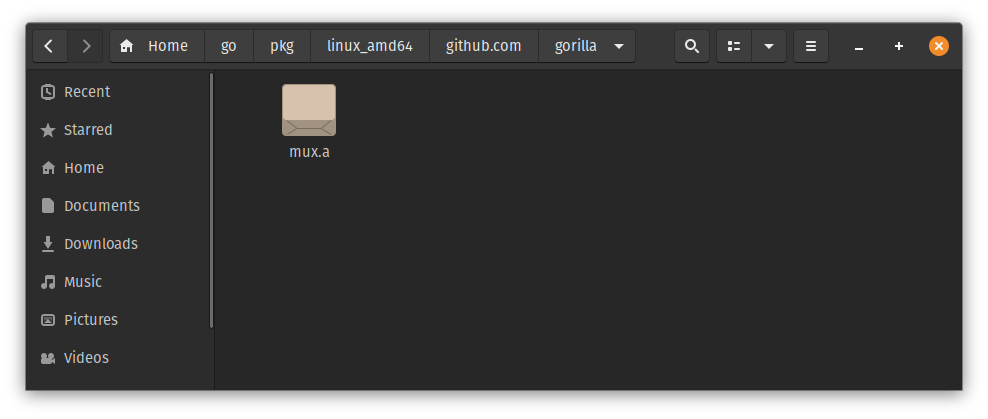Golang: Rest api and routing using MUX
Bài đăng này đã không được cập nhật trong 5 năm
Routing with MUX
Let's create a simple CRUD api for a blog site.
We'll need 5 routes
# All
GET articles/
# Single article
GET articles/:id
# Create new
POST articles/
# Update an article
PUT articles/:id
# Remove article
DELETE articles/:id
First, we create a main.go file in our project directory
touch main.go
Fill in the skeleton code inside
package main
func main() {
}
For routing, we'll use a package called mux
We can download that by running
go get -u github.com/gorilla/mux
If you check your $GOPATH/pkg directory, you'll find the newly downloaded package mux inside.

Now, that we have downloaded mux, let's initialize it in our main.go file.
For that we need to import it first.
package main
import (
"github.com/gorilla/mux"
)
func main() {
router := mux.NewRouter()
}
Adding routes to mux is very easy. You just need to write the route, the function it should run and what HTTP method it's responding to
router.HandleFunc("/api/articles", getArticles).Methods("GET")
This means, whenever our app will receive a GET request in "/api/articles" path, we'll run the getArticles function.
We haven't defined the function yet, for now we just want seed data to be returned. Kind of
func getArticles() {
return listOfArticles
}
So, we should make our seed data first, before we move on to writing getArticles method.
For an article object and a user object, we need to create a struct like
type User struct {
ID string
Username string
Email string
}
type Article struct {
ID string
Title string
Description string
Content string
Author *User
}
Note that, each article will have an Author filed, which an object of the struct User.
For listOfArticles, we'll use a slice
[]Article{
Article{
ID: "1",
Title: "Learning golang",
Description: "an introduction to the go ecosystem",
Content: "...",
Author: &User{
ID: "1",
Username: "salekin",
Email: "ss@gmail.com",
},
},
Article{
ID: "2",
Title: "Learning GIN",
Description: "intro to GIN framework",
Content: "...",
Author: &User{
ID: "1",
Username: "salekin",
Email: "ss@gmail.com",
},
},
}
Also, if we want to return the filed names different in json from the struct we can modify the struct like
type User struct {
ID string `json:"id"`
Username string `json:"user"`
Email string `json:"email"`
}
type Article struct {
ID string `json:"id"`
Title string `json:"title"`
Description string `json:"description"`
Content string `json:"content"`
Author *User `json:"author"`
}
At this point, our main.go should be like
package main
import (
"github.com/gorilla/mux"
)
var articles = []Article{
Article{
ID: "1",
Title: "Learning golang",
Description: "an introduction to the go ecosystem",
Content: "...",
Author: &User{
ID: "1",
Username: "salekin",
Email: "ss@gmail.com",
},
},
Article{
ID: "2",
Title: "Learning GIN",
Description: "intro to GIN framework",
Content: "...",
Author: &User{
ID: "1",
Username: "salekin",
Email: "ss@gmail.com",
},
},
}
type User struct {
ID string `json:"id"`
Username string `json:"user"`
Email string `json:"email"`
}
type Article struct {
ID string `json:"id"`
Title string `json:"title"`
Description string `json:"description"`
Content string `json:"content"`
Author *User `json:"author"`
}
func main() {
router := mux.NewRouter()
router.HandleFunc("/api/articles", getArticles).Methods("GET")
}
Finally, we have time to create our getArticles function.
func getArticles(w http.ResponseWriter, r *http.Request) {
json.NewEncoder(w).Encode(articles)
}
Easy as that. Now we fill in the rest of the routes.
Get article
We will loop through the list of articles, and return the one that matches with the id we sent in url
func main() {
router.HandleFunc("/api/articles/{id}", getArticle).Methods("GET")
}
func getArticle(w http.ResponseWriter, r *http.Request) {
params := mux.Vars(r)
for _, article := range articles {
if article.ID == params["id"] {
json.NewEncoder(w).Encode(article)
return
}
}
}
Create new article
We'll create a new article object of struct Article and add it to the articles slice.
func main() {
router.HandleFunc("/api/articles/", create).Methods("POST")
}
func create(w http.ResponseWriter, r *http.Request) {
article := Article{}
_ = json.NewDecoder(r.Body).Decode(&article)
article.ID = strconv.Itoa(len(articles) + 1)
articles = append(articles, article)
json.NewEncoder(w).Encode(article)
}
Update an article
func main() {
router.HandleFunc("/api/articles/{id}", update).Methods("PUT")
}
func update(w http.ResponseWriter, r *http.Request) {
params := mux.Vars(r)
article := Article{}
_ = json.NewDecoder(r.Body).Decode(&article)
article.ID = params["id"]
for i, article := range articles {
if article.ID == params["id"] {
articles[i] = article
break
}
}
json.NewEncoder(w).Encode(article)
}
Delete an article
func main() {
router.HandleFunc("/api/articles/{id}", delete).Methods("DELETE")
}
func delete(w http.ResponseWriter, r *http.Request) {
params := mux.Vars(r)
for i, article := range articles {
if article.ID == params["id"] {
articles = append(articles[:i], articles[:i+1]...)
break
}
}
json.NewEncoder(w).Encode(articles)
}
Source code
All rights reserved